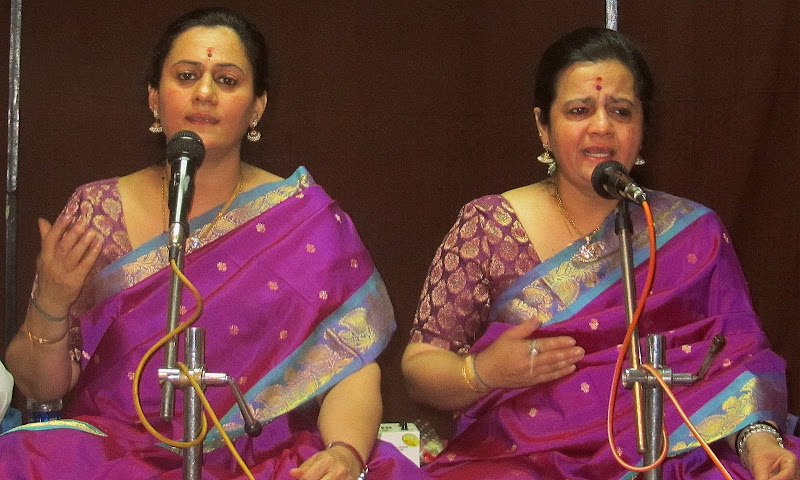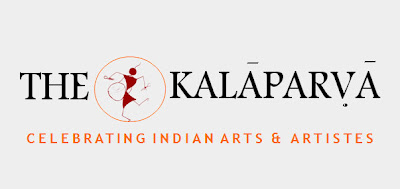 | |
| Saralaya Sisters (Vidushis Kavitha and Triveni) | |
Nadasurabhi conducted a three day special event "Karnataka Vaibhava" from the 17th to 19th August 2012 at the Indian Heritage Academy Hall, Koramangala, Bangalore. The aim was to bring top class Karnataka based carnatic musicians to the rasika and to focus on the contributions of composers of Karnataka who are spread over several centuries till the present time. Inaugurating the festival, Dr. R.V.Raghavendra, Managing Trustee, Ananya while appreciating the initiative, pointed how it also helps the artists to learn, specialize and present such thematic concerts.
The first in the series was a vocal recital by Vidushis Kavitha and Triveni, popularly known as Saralaya sisters. With their years of grooming and experience they presented a soulful concert featuring the compositions of Karnataka composers like Sri Purandaradasa, Mysore Vasudevacharya, Muthiah Bhagavatar, Mysore Sadashiva Rao, Maharaja Jayachamarajendra Wodeyar, as well as those of contemporary composers like Vidushi Vasantha Madhavi . Songs were not only in Kannada but also in telugu and sanskrit. The main songs were in raga Dharmavathi - Bhajanaseya radha, Ksheerasagara shayana in raga Mayamalavagowla, Sree Kamakoti peetasthithe in raga Saveri. A crisp delinioation of these ragas followed by neat rendition of swaras and neravals at relevant places were impressive. Young Aditi Krishnaprakash gave understanding support while senior percussion artists Vidwan V.S. Rajagopal on mridangam and T.N. Ramesh on ghatam were very vibrant and added colour to the concert.
 | |
| Vidwan D. Balakrishna and Vidwan V.Vamshidhar | |
The second day saw the 'Veena - Venu' concert of Vidwan D. Balakrishna and Vidwan V.Vamshidhar. The blend of the dignified veena strings with the mellifluous flute brought in a sublime atmosphere. Here again the artists chose to play the compositions of Karnataka artists. They began the concert in a grand way with 'Sri Mahaganapathim Bhaje' of Maharaja Jayachamarajendra Wodeyar in raga Athana which is known for its majesticity, followed by short swara patterns. Their presentation was a mixture of many popular and some rare but good songs and ragas. Lalithe Sree in a rare raga "Bhuvana ghandhari' composed by Veena Venkatagiriyappa was brisk and interesting. Taramugadura was once again a rare song in raga Dharmavathi composed by Veena Seshanna. Brief sketches of ragas and short chains of swaras were well incorporated. A detailed Kamach raga was followed by lovely Brochevarevarura - a master piece, which immortalised Mysore Vasudevacharya for this composition. Next came another popular masterpiece by the same composer in raga Abheri - Bhajare re manasa. The artists brought out the inherent beauty and bhava in both these compositions. The main item of the day was Kambhoji. A detailed raga was followed by the Mysore style of thana incorporating ragamalika in the five gana raagas. Sri.Balakrishna handled these exclusively and brilliantly. One cannot concieve the idea of carnatic music without the Saint composer Thyagaraja. So the artists wanted to pay their obeisance to Thyagaraja by playing one of his gems 'O Rangasayi'. This was followed by a tani avartanam by young, challenging artist Vidwan B.C. Manjunth on mridangam and seasoned artist Vidwan G.S. Ramanujan on ghatam. They displayed an excellent performance and took the quality of the concert to greater heights.
 | |
| Dr. T.S. Sathyavathi | |
Dr. T.S. Sathyavathi's vocal concert on sunday the 19th, was a grand finale to the three day festival. She chose gems from the treasure trove of Haridasas of Karnataka, to add grandeur to the first effort of nadasurabhi to throw open to the audience, the wealth of karnataka lyrics and compositions. Starting from Purandadaradasa, she covered a comprehensive range of songs composed by all major Haridasas, both popular and lesser known items. A scholar that she is, in sanskrit, music and musicology, she explained the meaning of the song and announced the raga and tala into which the particular song was set and moreover, she did not fail to include the date and time of Dasa who composed that particular song and the purport of the song. Her authority over the subject, fluency of language, expertise in the field of music all added to her immaculate presentation of the programme. It seemed more like a lecture demonstration, educating us on various aspects of music as well as daasa saahitya. She chose the compositions of Vadiraja, Sripadaraja, Purandaradasa, Kanakadasa, Vijayadasa, Jagannathadasa and Amba Bai. 'Ranganathana noduva banni' in raga Dhanyasi, ' Ninna naa nenedeno' in raga varali, 'Thatithkoti' in raga 'kamavardhini were impressive. Bhairavi was the main raga and was followed by Vasudevana of Purandaradadsa. Later a tani avartanam by Vidwan Jayachandra Rao and Raghavendra Prakash with electrifying laya patterns received a long and appreciative applause. She concluded the concert with two more pieces, Tunge mangala tarange in raga sindhu bhairavi and Anandamayage chinmayage in Madhyamavathi. Vidushi Nalina Mohan gave able support on the violin.
On all three days there was excellent response to the new initiative taken up by Nadasurabhi. The audience were very supportive with good feed back and they thoroughly enjoyed all the three concerts.

